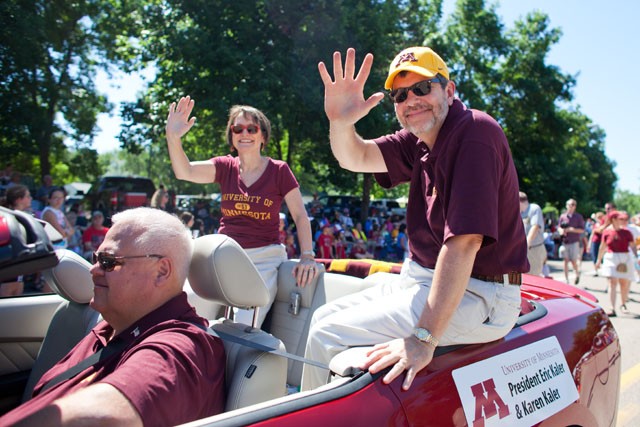Amid unpacked boxes and personal trinkets, Eric Kaler seems at ease even after a long day of interviews and meetings in his Morrill Hall office.
After officially taking over as the University of MinnesotaâÄôs 16th president Friday, he has taken charge of a $3.7 billion budget and more than 80,000 students and employees across five campuses in a tumultuous time of declining state support âÄî something he said will likely have to be addressed through more cuts and tuition hikes.
Kaler, while wrapping up his tenure as provost at New YorkâÄôs Stony Brook University, made a few interim visits to campus in the months since his appointment by the Board of Regents in November.
As the second University alumnus to become president, Kaler is no stranger to campus. But itâÄôs been 30 years since he received a doctorate degree in chemical engineering from the school in 1982.
Since then, the University has grown in size, budget and prestige. ItâÄôs also found itself using more tuition than state money to pay its bills.
The president plans to spend the first three months of his time in meetings âÄî listening.
âÄúI found out that I learn more when my mouth is shut than when itâÄôs open.âÄù
The âÄòleading cheerleaderâÄô
The biggest challenge Kaler faces now is to maintain the quality of the University with less money, he said.
State money to the University has steadily declined in recent years, with the school getting $70.9 million less this year than last.
Quality at a university involves quality faculty, Kaler said. He is concerned about the level of faculty compensation, which at the current level âÄúmakes our stars vulnerable to recruiting by other institutions.âÄù
KalerâÄôs own compensation is $610,000 annually, plus $50,000 in retirement payments his second, third and fourth years.
The University Board of Regents has previously stated that the figure was set for strategic reasons; in order to attract the best people, they said, the pay has to be high. But Kaler, who said he simply agreed to the offer, deems his salary appropriate.
âÄúObviously it is a big number, but itâÄôs a very, very big job, and itâÄôs a big institution,âÄù he said.
Former President Bob Bruininks made $455,000 a year base salary, but also had greater retirement benefits than Kaler has.
But while faculty compensation might increase, others may see cuts. If state support dwindles further, Kaler said tuition will have to rise again. The school also has to take an aggressive look at its administrative structure and costs, he said.
Even athletics might take a hit.
âÄúYou have to balance the opportunities versus the cost âÄî the benefits versus the cost âÄî and weâÄôll be doing this all across, including athletics.âÄù
But Kaler is not completely giving up on state support and plans to spend a lot of time campaigning and conversing at the state Legislature.
âÄúI need to be the leading cheerleader âĦ for the University,âÄù he said.
His plans also include private fundraising. That sector, Kaler said, could be âÄúthe difference between good and great,âÄù and he intends to spend a lot of time and energy to secure more donations for the school.
And Kaler has fundraising experience: Although his position at Stony Brook was academic and not athletic, Kaler secured the largest ever donation to that school from an ex-football player.
Settling in
On his first day at the University, a table in KalerâÄôs office is not cluttered with papers and reports, but with chickens.
A hen plush of the mascot for the University of Delaware, where Kaler worked as the College of Engineering dean, gave start to his collection of chicken-themed gifts.
Finding place for them is just part of the hectic process of moving in the UniversityâÄôs top administrator. And Kaler is expected to hit the ground running.
Next Wednesday, Kaler will present the 2012 preliminary capital budget to the Board of Regents.
Kaler said he had some input in the process and is happy to endorse it to the board, though there is âÄúa long list of thingsâÄù he wishes he could add.
Any major changes are unlikely, however, as Kaler said the budget is already far along in the planning.
The meeting will include KalerâÄôs first address to the board as president.
The three regents elected since the beginning of the year have only met Kaler briefly, but Regent Clyde Allen, former chairman of the board, said that shouldnâÄôt be a problem. The board will listen to what Kaler has to say and respond accordingly, Allen said.
But itâÄôs still not clear which priorities Kaler will set for himself and for the University.
He said he is still going through âÄúan orientationâÄù and has a lot to look over and evaluate before deciding the direction he wants the University to go.


